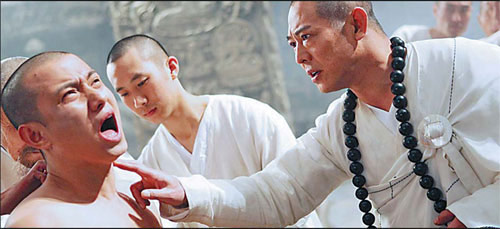Cast aside
 |
|
Alfred Hsing (middle) plays a supporting role in the film, The Sorcerer and the White Snake, starring Jet Li (right). |
The Chinese film industry has been prosperous in recent years. The box office has soared, with an annual growth of about 30 percent since 2003.
"The booming Chinese film market is definitely an important reason for more Asian actors to come to China to act," says Brian Yang, who has just wrapped up his part in The Man with the Iron Fists, a China-US co-production shot partly in Hengdian, a small town and shooting base in East China.
"There were multiple productions in Hengdian. Take the wrong turn and you walk into another movie. Here is a comedy in production, but 500 meters away is a war story," he recalls.
Wesley Wong, 25, is working on a master's degree in acting at Beijing Film Academy, after finishing his undergraduate studies at USC. He says that in 2007, there were only two Asian American/Canadian students studying acting at BFA, but in 2012 the school recruited six or seven.
According to Wong, after Chinese-Canadian Dou Xiao, also a BFA student, led Zhang Yimou's Under the Hawthorn Tree in 2010, five young Chinese-Canadian actors arrived at the school to learn acting.
While many assume these young actors with their bilingual abilities do not have to worry so much about getting jobs in such a flourishing industry in China, they suffer from confusion of identity and another kind of stereotype.
"We don't exist here or there," says Brian Yang. "In Hollywood, we are minorities and stereotyped. We are what they think Chinese should be, not true Americans. But in China, we are Americans. We don't belong to either place."
Alfred Hsing shares the pain.
"I can only appear in stories that happen after reform and opening up," he jokes.
Due to their "ABC" (American-born-Chinese) accent and temperament, these actors usually get roles as businessmen at international companies. Rarely can they play in rural stories or costume dramas.
Cary Woodworth is a friend to Yang and some other Asian-American actors. The European-looking actor has worked in 10 Chinese productions since 2004. As an observer and insider, he understands his friends' predicament.
"In the US, Asian-American actors are totally judged by their faces, and here in China, by their accent. Some of them are great actors who have things to give, but because they don't speak fluent Chinese, they lose a lot of opportunities."
Yang once met a Chinese producer who told him: "We have plenty of Chinese actors who speaks perfect Chinese, so why should we cast someone who pretends to be Chinese?"
But he tries to see the bright side of things.
"I think there will be more stories that introduce the West to the East and the other way round. Hopefully there will be more films that need more actors who will bridge the two."
Only when changes happen within the industries of both countries will actors have the best of both worlds, believes Osric Chau.
"To change the stereotypes of Asians in Hollywood films requires more Asians to work in the industry as powerful decision makers, such as scriptwriters, directors and producers. Hopefully they will think more inclusively about Asian actors," he says.
Lillian Ng, the talent manager and producer, suggests filmmakers in China be more open to these actors.
"Their disadvantage may come be in communicating and connecting with the audience," she says, "but many of them are well seasoned bilingual actors, breaking through the language barrier and can play any character."
Alfred Hsing, who has been practicing Mandarin very hard, was rewarded by an offer to play in a period drama in the 1940s. Although he missed it due to scheduling problems, he feels his effort has been acknowledged.
"We must be fully prepared," he says.
Contact the writer at liuw@chinadaily.com.cn.
















